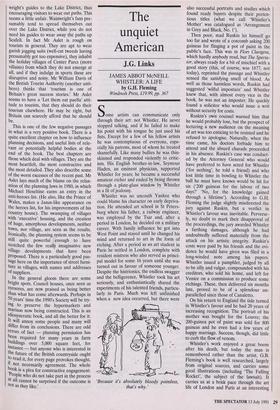Alas, alas, for England
George Clive
COUNTRYBLAST by Clive Aslet, with drawings by Michael Heath John Murray, f9.95, pp.135 This is a fascinating and disturbing book. Clive Aslet's proposition is that the last decade has been peculiarly dreadful for the British countryside, that between them, some farmers, most developers, most tourists and all motorists are destroying what remains of the countryside with unprecedented thoroughness. This is argued with verve and wit, and also with a measure of good sense — not all conifers are bad, not all hedges should be sacro- sanct, and so forth. It is splendidly illustrat- ed by Michael Heath, with pictures which are a delicate mixture of Heath and Thomas Bewick; charming rural scenes turn, on closer inspection, into views of grotesque late 20th-century horror.
At the end of the book are two lists, heroes and anti-heroes of the countryside. The Prince of Wales has the distinction of appearing twice, once as a hero (for saving the National Apple Collection at Brogdale) and once as an anti-hero (in the Duchy of Cornwall's efforts to convert barns at Caradon into houses). Michael Joseph are anti-heroes in publishing Alfred Wain- wright's guides to the Lake District, thus encouraging visitors to wear out paths. This seems a little unfair. Wainwright's fans pre- sumably tend to spread themselves out over the Lake District, while you do not need his guides to wear away the paths up Scafell. In fact Mr Aslet is rough on tourists in general. They are apt to wear garish jogging suits (well-cut tweeds having presumably got too expensive), they inhabit the holiday villages of Center Pares (more villains) from which they do not emerge at all, and if they indulge in sports these are disruptive and noisy. Mr William Davis of the British Tourist Authority (another anti- hero) thinks that 'tourism is one of Britain's great success stories.' Mr Aslet seems to have a 'Let them eat paella' atti- tude to tourists, that they should do their tourism elsewhere. He may be right, but Britain can scarcely afford that he should be.
This is one of the few negative passages in what is a very positive book. There is a quite excellent chapter on how to influence planning decisions, and useful lists of rele- vant or potentially helpful bodies at the end of the book. The best chapters are those which deal with villages. They are the most heartfelt, the most constructive and the most detailed. They also describe some of the worst excesses of the recent past. Mr Aslet lays much of the blame on the relax- ation of the planning laws in 1980, in which Michael Heseltine earns an entry in the anti-heroes list. (He also, like the Prince of Wales, makes a Janus-like appearance on the heroes list, for his improvements of his country house). The swamping of villages with 'executive' housing, and the creation of huge, amorphous developments, neither town, nor village, are seen as the results. Ironically, the planning system seems to be still quite powerful enough to have scotched the few really imaginative new village developments that have been proposed. There is a particularly good pas- sage here on the importance of street furni- ture in villages, with names and addresses of suppliers.
In the general gloom there are some bright spots. Council houses, once seen as eyesores, are now praised as being better Than what has come afterwards. Perhaps in SO years' time the 1990's Society will be try- ing to preserve the hypermarkets and marinas now being constructed. This is an idiosyncratic book, and all the better for it. It will annoy some people and many will differ from its conclusions. There are odd errors of fact — planning permission has been required for many years in farm buildings over 5,000 square feet, for instance — but anyone who is interested in the future of the British countryside ought to read it, for every page provokes thought, if not necessarily agreement. The whole book is a plea for constructive engagement: People who do not take part in the process at all cannot be surprised if the outcome is not as they like.'



















































 Previous page
Previous page